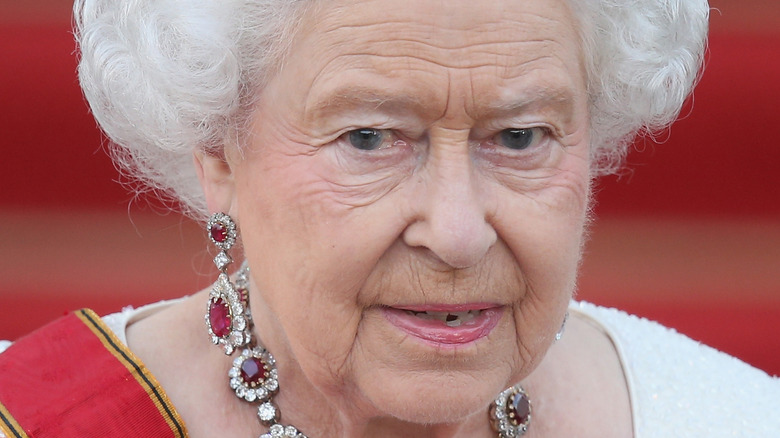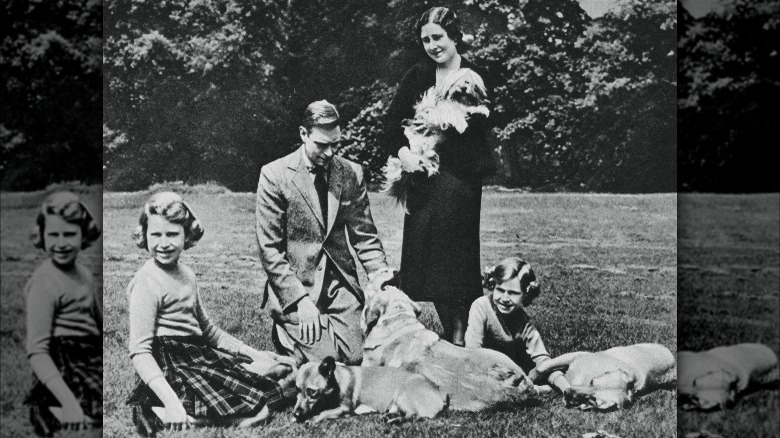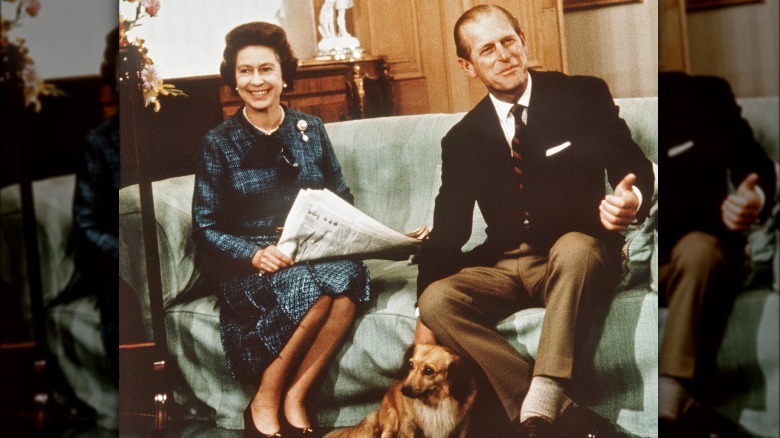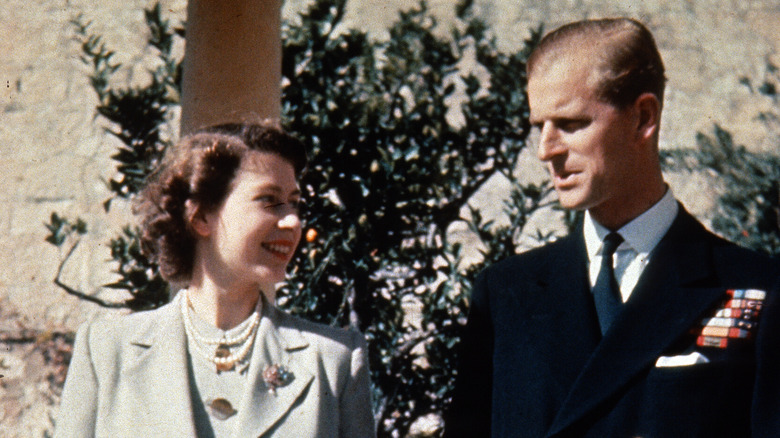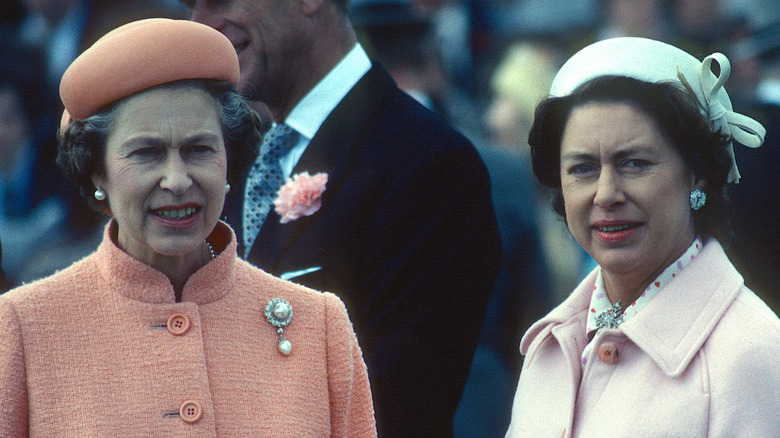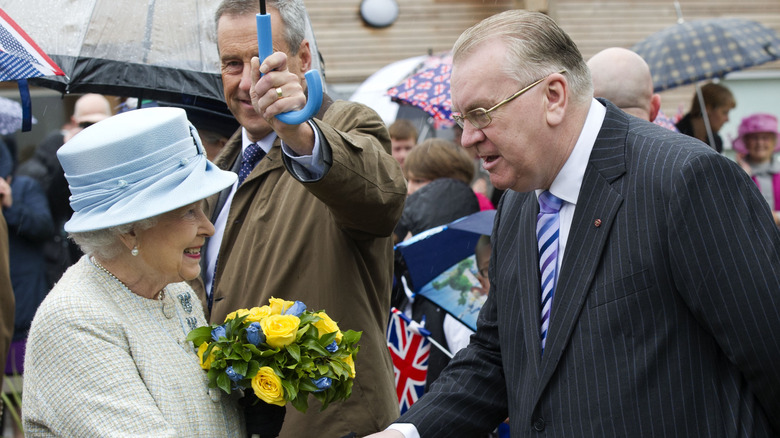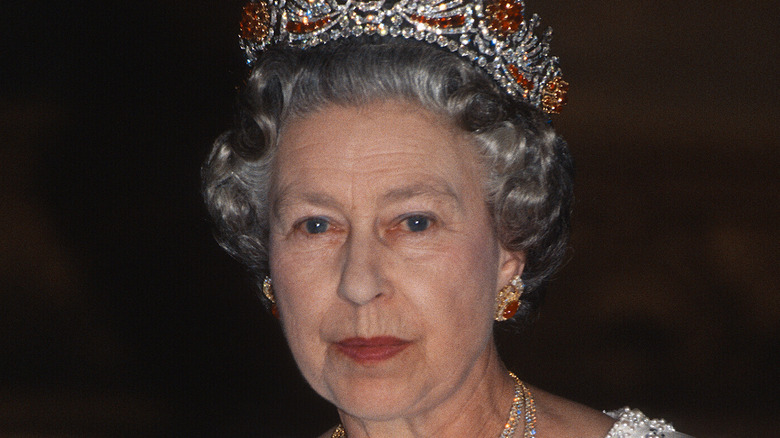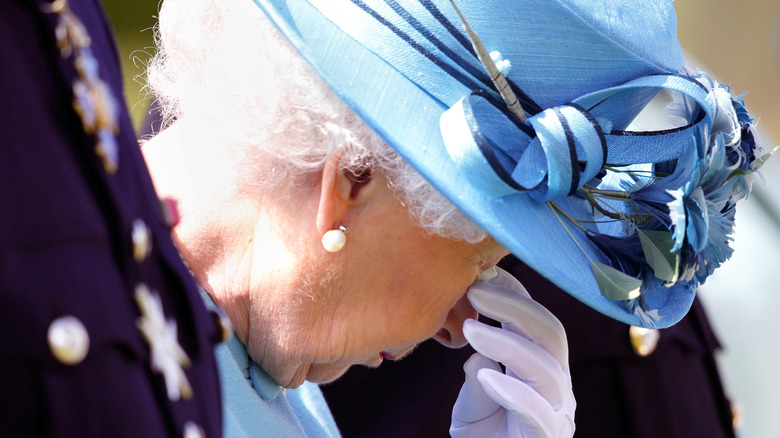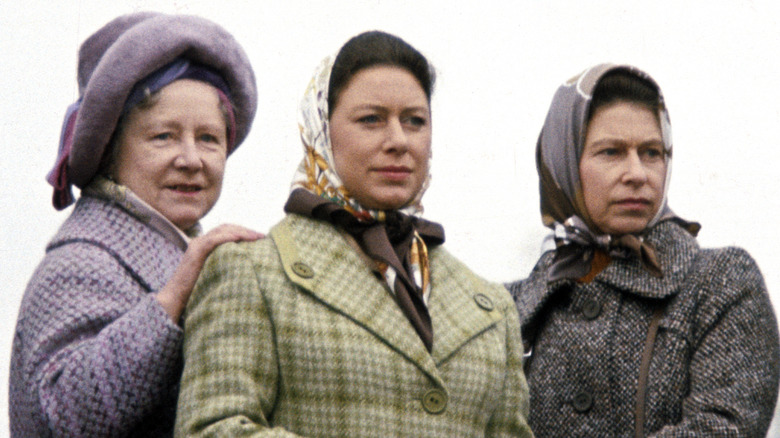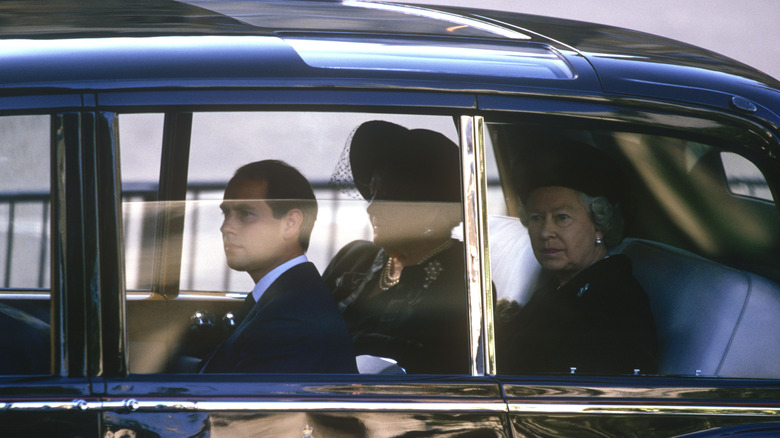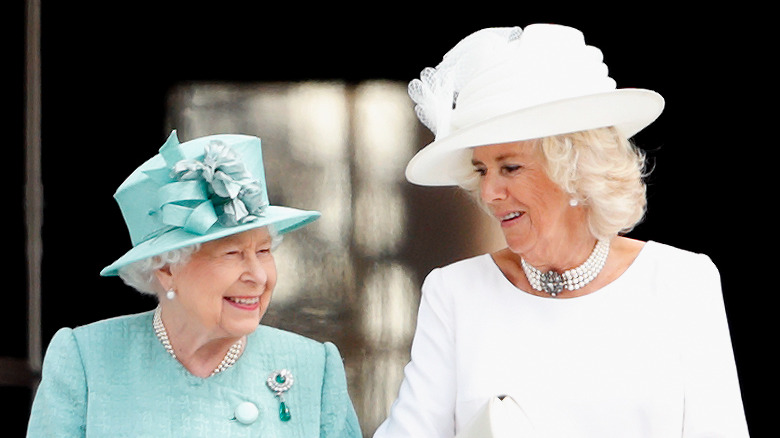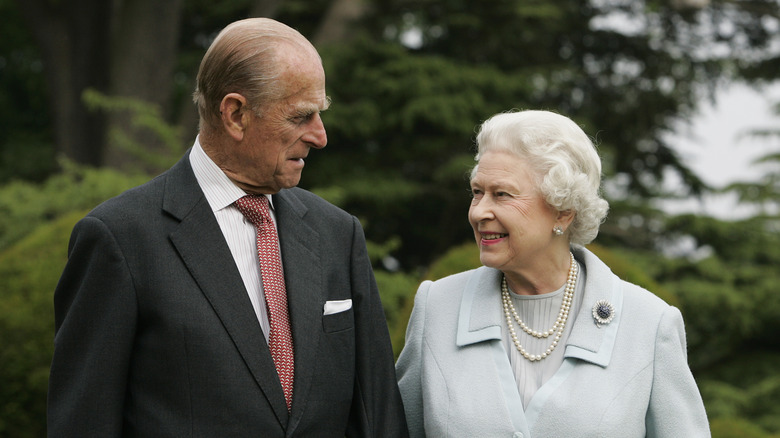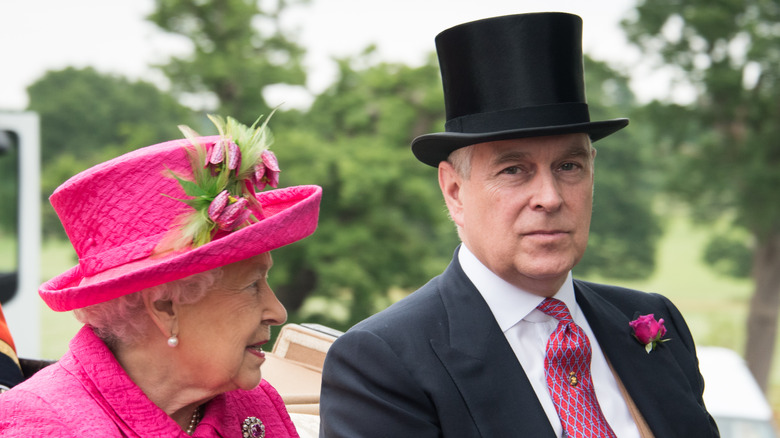Tragic Details About Queen Elizabeth
The following article references sexual assault allegations.
Queen Elizabeth II was crowned on June 2, 1953 after her father, King George VI, died. The ceremony was held in Westminster Abbey and ever since, she's been the fixture and face of the British monarchy. Her coronation caused a stir because, as The Independent notes, it was televised, which "was a considerable novelty" at the time. People all over the world were able to watch the broadcast, and thanks to the burgeoning technology in her reign, people have only continued to stay connected to Queen Elizabeth.
The ongoing fascination with Queen Elizabeth and the rest of the royal family has sold more than a few newspapers and kept eyes on the family, both through their happy moments and through the many scandals they've weathered. Prince Andrew's connection to Jeffrey Epstein caused a stir, as did the subsequent civil case filed against him by one of the victims. There are too, of course, the age-old scandals involving the love triangle between Prince Charles, Camilla Parker-Bowles, and Princess Diana. Then there were the later events, like Meghan Markle's big entrance — and later exit — from the royal family. This was followed by her and Prince Harry's bombshell interview with Oprah Winfrey that once again rocked the royal family.
The ongoing message is that the queen has been through it and continues to survive the scandals and surprises that rock the royal family. While she's got the world at her fingertips, Queen Elizabeth has been through some heartbreaking tragedies.
The death of her father and her coronation
Queen Elizabeth II was never actually destined to be queen. Her uncle, King Edward VIII, abdicated the throne for the love of Wallis Simpson, leaving her father, Albert, to unexpectedly become King George VI, per Time. It would seem that no one in her immediate family wanted the job. As Time notes, King George VI later wrote that he "broke down and sobbed like a child" when he realized that he'd have to become king.
There was a similar sentiment between Elizabeth and her sister Margaret. As the story goes, Margaret asked: "Does that mean you will have to be the next queen?" When Elizabeth affirmed this, Margaret said, "Poor you."
So on February 6, 1952, when Elizabeth and Prince Philip were in Kenya, it was a double blow to discover that her father died but also that the role of her life was just about to begin. The turn of events was terrible for both of them. Commander Michael Parker, according to Express, saw what the news meant to the two royals. "Philip looked as if you'd dropped half the world on him," he said. "[Philip] took Elizabeth up to the garden and they walked up and down the lawn while he talked and talked and talked to her." Elizabeth not only had to step up to the throne, but she lost her beloved father.
The death of Susan, her beloved corgi
It is a truth universally acknowledged that Queen Elizabeth II is a dog woman. The love affair began on her 18 birthday when her dad gave her Susan, a corgi who would start a dynasty of royal breeding. Prior to Susan, there was a corgi called Dookie that King George VI brought home in 1933, according to the Daily Mail.
There's a royal cemetery at Sandringham Estate that was first established by Queen Victoria and in 1959, per a later publication by the Daily Mail, when Queen Elizabeth had to bury Susan, she chose this historic spot as her beloved dog's resting place. The queen had a tombstone made for her first pet that read, "Susan... For almost 15 years the faithful companion of the Queen," with her date of birth and death added.
In 2018, when the queen's corgi Willow died, many thought it might be the last of the line to ever serve her. An insider at Buckingham Palace told the Daily Mail, "She has mourned every one of her corgis over the years, but she has been more upset about Willow's death than any of them. The source added, "It is probably because Willow was the last link to her parents and a pastime that goes back to her own childhood. It really does feel like the end of an era." Any dog lover knows that the death of a pet leaves a void that's virtually impossible to fill.
Conflict around her choice in Prince Philip as a husband
Prince Philip wasn't a huge hit when he first arrived as the most likely bachelor for Queen Elizabeth II. Of course, she was still a princess at the time and as Elizabeth went, Philip was the one, no doubt about it. Lady Anne Glenconner said that Elizabeth "realized her destiny and luckily set her heart on Prince Philip at an early age. He was ideal—good-looking and a foreign prince," according to Vanity Fair.
However, the rest of the royal family wasn't enamored with him. Philip came from Greece and had an unusual childhood and his mother, after struggles with mental health, became a Greek Orthodox nun. Nevertheless, they continued their romance and Philip proposed in 1946 and her father, King George VI, requested that "they keep their engagement a secret until it could be announced after her 21st birthday."
Oddly enough, there was one specific reason that the rest of the royal family objected to Philip and it had to do with his humor. Royal biographer A.N. Wilson said, according to The Telegraph, the family tried to talk Elizabeth out of a relationship with Philip because he was too much of a joker. "They said it for lots of reasons, but the fact is he was wrong," Wilson said. "The Queen is a very reserved, diligent person. He isn't. He was a naval officer and he was also quite funny." But Elizabeth got her way in the end and probably laughed a lot, to boot.
The queen's complicated relationship with her sister
Queen Elizabeth II and Princess Margaret have always had a complicated but loving relationship. For fans of Netflix's "The Crown," you'll know that there was ongoing friction between the sisters. Royal biographer Andrew Morton spoke to Vogue about the royal siblings' dynamic. "There's always tension, because the heir gets the final say, and the spare, however good, however brilliant, however dynamic, however charismatic they are, is always second in command, the wingman," he said.
Part of the pressure came from their differing personalities. Elizabeth was reserved while Margaret was charismatic and outgoing. "If you weren't Queen, nobody would talk to you," Margaret once said to her sister. While Margaret had an easier time socializing, Morton noted that there was still envy on her part for Elizabeth's role.
Despite all of this, there was so much love between them. "The Crown" missed the mark, according to Morton, in describing the tension between Elizabeth and Margaret over the latter's relationship with Peter Townsend. In the Netflix show, Elizabeth doesn't stand up for her sister's love. However, in reality the "Queen did her utmost" to preserve their relationship and was more than willing to go to bat against "the Church and government," who were the real barricades in Margaret and Townsend's relationship. So while there were obviously some rifts over the years, the sisters loved each other deeply. As Morton told People, Princess Margaret "was someone who understood the Queen in a way no one else could."
The queen's delay in visiting Aberfan
In all of the years of Queen Elizabeth's reign, there's one event that still reportedly fills her with remorse. In 1966, the coal mining town Aberfan was crushed by a mudslide when a "colliery spoil tip located directly above the village slid downhill," per Hello! magazine. An eyewitness told Channel 4 News it was "just a traumatic loud, loud banging noise, and it just got louder and louder and louder. Something was coming."
The tragedy left 144 people dead, the majority of them being children. Prince Philip arrived the next day to show his support but the queen kept away on the logic that the sight of her there would create more of a frenzy while rescue was underway. In her book "Elizabeth the Queen," royal biographer Sally Bedell Smith quoted the queen, saying, "Perhaps they'll miss some poor child that might have been found under the wreckage."
The queen took eight days to get to Aberfan. According to sources, she would later say delaying her arrival was one of her "biggest regrets." Per Hello!, royal press member Sir William Heseltine said, "I think she felt in hindsight that she might have gone there a little earlier. It was a sort of lesson for us that you need to show sympathy and to be there on the spot, which I think people craved from her." It was a complicated situation but it brought the queen a lot of grief years later.
She called 1992 the 'horrible year'
For Queen Elizabeth II, 1992 was a dud, something she said herself in a speech on November 24 of that year. "1992 is not a year on which I shall look back with undiluted pleasure," she expressed. "In the words of one of my more sympathetic correspondents, it has turned out to be an 'Annus Horribilis.'"
For starters, Prince Charles and Princess Diana's marriage was on the rocks. To make matters worse, Andrew Morton's biography "Diana: Her True Story" came out that June. The book revealed Diana's unhappiness in her marriage and the involvement of Camilla Parker-Bowles, per Biography, and while Diana initially said she knew nothing about the book's genesis, it later came out that she was involved.
Simultaneously, Prince Andrew and Sarah Ferguson separated. In the summer of 1992, Ferguson was photographed "having her toes sucked in the south of France by her 'financial adviser' John Bryan," per The Guardian. Then Princess Anne divorced husband Mark Phillips that year after both had affairs during the marriage, according to Express. "Anne was also involved in an extramarital affair with Tim Laurence (Laurence was the queen's equerry), whom she married in December 1992," Marlene Koenig, a royal correspondent, told Express. Oh, and we almost forgot: On November 20 of this "Annus Horribilis," Windsor Castle was nearly destroyed in a fire that decimated 115 rooms, according to the Royal Collection Trust, after a spotlight in the chapel overheated a curtain. So yeah, not exactly a banner year.
Decommissioning the royal yacht
Us commoners might not get this one. Queen Elizabeth has rarely been photographed crying but one rare occasion when she was seen wiping away tears, it was about a yacht. According to Hello!, the queen first launched the Royal Yacht Britannia in April 1953. The vessel was very significant to the royal family in its 44 years of use. In 1981, Prince Charles and Princess Diana used it for part of their honeymoon and the queen and her brood frequently used the Britannia for family vacations. The yacht was also used to politically entertain. As Hello! notes, the boat was used "on 696 foreign visits and 272 visits in British waters." The Britannia had traveled over one million miles.
Despite its use and the happy memories, the Britannia had to be decommissioned and the announcement came on June 23, 1994, according to The Royal Yacht Britannia. The money to keep it in working order was more than the Labor Government, which was in power at the time, was willing to spend. The royal family attended the decommissioning ceremony and the queen was seen crying at the event.
The boat is still used today but in a different fashion. It's docked at the Port of Leith in Edinburgh, Scotland and all of the clocks on the boat are frozen at 3:01, which is, as Hello! noted, "the time that the Queen last disembarked the vessel." Obviously, she had many fond memories on that vessel and it was hard to say goodbye.
Losing her mother and sister in the same year
Queen Elizabeth's mother, the Queen Mother, died at the age of 101 on March 30, 2002, per People. The Queen Mother was a popular figure among the U.K.'s people and of course, much loved by her daughter. In a "rare" moment, the queen gave a televised speech the night before her mother's funeral, touching on the eternal pain of losing a family member.
"Over the years I have met many people who have had to cope with family loss, sometimes in the most tragic of circumstances," the queen said. "So I count myself fortunate that my mother was blessed with a long and happy life." She spoke of her mother's "infectious zest for living" and the function of faith in her mother's life, which offered her comfort. Queen Elizabeth added that what her mother loved best "the warmth and affection of people everywhere which inspired her resolve, dedication and enthusiasm for life."
Her funeral was held at Westminster Abbey in London and to mark all the years of her life, the bell tolled 101 times for the Queen Mother, according to The Sun. It was a rough go for the queen. Her sister, Princess Margaret, died less than two months before, on February 9, 2002, after suffering a series of strokes. The Queen Mother was able to be present at Margaret's funeral. Those are two serious losses to take, one after the other.
Public scrutiny following Princess Diana's death
Princess Diana's death rocked not only the royal family but the world. The people's princess was killed in a car accident in Paris on August 31, 1997. Queen Elizabeth was hit with criticism for not returning to London immediately following the tragedy. Instead, she stayed at Balmoral Castle, with Princes William and Harry.
Staying with Diana's grieving sons is a logical and understandable decision, but the public took it as a sign of coldness on the part of the queen. In fact, as the BBC notes, the days after Diana's death were "the worst of the Queen's reign," showing photos of newspapers at the time with the queen's face on the cover and the heading: "Show Us You Care." It was a devastating time for the royal family but the queen was hit the hardest with public scrutiny.
In a letter that was unearthed from the queen to her lady in waiting, Lady Henriette Abel Smith, ABC News reveals that it was indeed her grandsons who were her main focus at the time. "It was indeed dreadfully sad, and she is a huge loss to the country," the queen wrote. "But the public reaction to her death, and the service in the Abbey, seem to have united people round the world in a rather inspiring way. William and Harry have been so brave and I am very proud of them." On top of dealing with loss, the queen was criticized for how she handled it.
Drama around Prince Charles and Camilla Parker-Bowles
Even before Princess Diana's death, Prince Charles' love affair with Camilla Parker Bowles wreaked havoc on the royal family and the harmony that Queen Elizabeth was trying to maintain within it. While both Charles and Camilla were married to other people, they began their affair in 1986, according to People, causing a stir among tabloids and newspapers at the time.
Diana's death meant that Charles and Camilla could finally be open about their relationship but the queen was extremely resistant to any contact with Camilla. Both the queen and the Queen Mother refused to allow Camilla at royal functions, according to the Daily Mail, and the queen called Camilla "that wicked woman." She was angry about the fact that Charles and Camilla hadn't stopped their affair during his marriage to Diana.
It was a long time before the queen acknowledged Camilla. As the Los Angeles Times reports, at Charles' 50th birthday party, she refused to attend because Camilla would be present. The tide finally turned when the Queen Mother died in 2002 and Camilla was permitted to attend the funeral as "a friend of the Queen Mother," in an effort to still not acknowledge the relationship. By the time Charles proposed in 2005, the queen had acquiesced to the relationship and attended their wedding. In fact, by the end, as the Daily Mail notes, the queen likely encouraged the marriage because it was more socially acceptable that Charles be married when he became king rather than living with his longtime lover.
Mourning Prince Philip after over 70 years of marriage
One of the more recent, and likely most difficult tragedies to hit Queen Elizabeth was the death of her husband, Prince Philip. He died on April 9, 2021, just before his 100th birthday. The couple had been married for over 70 years, ABC News reported, so it would be challenging for her to remember a time without him.
The queen, who was 94 at the time of his funeral, kept a calm demeanor, USA Today notes, but that doesn't mean the event wasn't difficult. Royal correspondent Victoria Arbiter told the outlet, "I don't think we can underestimate how significant a loss this is to the queen — it's undeniable this will be the hardest day of her life." Camera footage at the funeral kept with its tradition of avoiding close-up shots of the royal family's faces during the event.
Prince Andrew spoke of his mother's grief. "The queen, as you would expect, is an incredibly stoic person," he said, according to the BBC. "She described (his death) as having left a huge void in her life but we, the family, the ones that are close, are rallying round to make sure that we're there to support her." While she had her family around her, the queen still grappled with the loss of her husband. On her 95th birthday, she said in a statement that it was "a period of great sadness," according to ABC News. Clearly, it was a tragic adjustment after a long marriage.
Prince Andrew's scandal rocked the royal family
Prince Andrew, rumored to be Queen Elizabeth's favorite, caused an uproarious scandal due to his earlier friendship with Jeffrey Epstein. He was charged with sexual abuse by one of the victims, Virginia Giuffre, and the queen responded by stripping him of "his military titles and patronages" to many charities, according to NBC News. He is also prohibited from using his HRH title "in any official capacity," per the BBC. The wording of the removal of Andrew's titles makes it clear that the queen herself orchestrated this. "With The Queen's approval and agreement, The Duke of York's military affiliations and Royal patronages have been returned to The Queen," a statement from Buckingham Palace read, according to The Sun.
Royal correspondent David McClure said, "It's quite brutal in many ways — the queen is really putting a foot down and saying this cannot continue." He added, "It has become tremendously damaging in terms of the reputation of the whole monarchy, not just Andrew, so the queen really did have to make a decision." The events are egregious and paints the royal family in a negative light, something the queen has always tried to avoid, especially in a case as serious as this. Prince Andrew denied the allegations, settled out of court, and, as The Sun notes, he has been "banished forever" from the rest of the royal family, per the decision of the queen herself.
If you or anyone you know has been a victim of sexual assault, help is available. Visit the Rape, Abuse & Incest National Network website or contact RAINN's National Helpline at 1-800-656-HOPE (4673).

